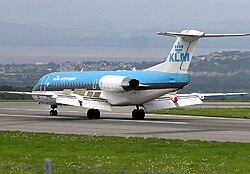This is an old revision of this page, as edited by Arpingstone (talk | contribs) at 19:48, 2 September 2004 (Pic added of KLM Fokker 70, and pics aligned). The present address (URL) is a permanent link to this revision, which may differ significantly from the current revision.
Revision as of 19:48, 2 September 2004 by Arpingstone (talk | contribs) (Pic added of KLM Fokker 70, and pics aligned)(diff) ← Previous revision | Latest revision (diff) | Newer revision → (diff)Fokker was a Dutch aircraft manufacturer.
History
The company was founded on July 21, 1919 by Dutchman Anthony Fokker, one of the world's early aviation pioneers. At age 20, he had built his first plane, the Spin (Spider), the first Dutch-built plane to fly in his home country. In 1912, he founded his first own company, Fokker Aeroplanbau in Berlin, Germany, later moving to Schwerin.
 |
 |
There, Fokker built planes for the German army during World War I, forced onto Hugo Junkers as a partner by the German governement. He gained fame with his planes the Fokker Dr.I (triplane) and the Fokker D.VII, with a mechanism that let pilots use machine guns on their planes without shooting their propellers.
In 1919, Fokker separated from Junkers, returned to the Netherlands and founded his own company. From then on, his main focus would be on commercial, civilian airplanes rather than military ones, though he would build those until World War II.
Amelia Earhart, the first woman to fly across the Atlantic (from the US to the small Welsh town of Burry Port) did so in a Fokker.
In December, 1939, Anthony Fokker died in the United States, where the American branch of his company was very successful.
The Fokker factories in the Netherlands were completely destroyed during World War II, and a new factory was built next to Schiphol Airport near Amsterdam, in 1951. There, a number of military planes were built under license, among which was Lockheed's F-104 Starfighter. A second production and maintenance facility was established at Woensdrecht.
In 1958, the Fokker F27 Friendship was introduced, which became the world's best selling turboprop airliner (selling almost 800 from 1958 to 1986). The F27 was followed by the Fokker F28 Fellowship, the Fokker F50, the Fokker F70 and the Fokker F100. Both an F27 and later an F28 served with the Dutch Royal Flight, Prince Bernhard himself being a pilot.
In 1969, the Fokker company agreed to an alliance with Bremen-based Vereinigte Flugtechnische Werke (representing ERNO) under control of a transnational holding company. They collaborated on an unsuccessful regional jetliner, the VFW-614. The European Space Agency ESA in June 1974 named a consortium headed by ERNO-VFW-Fokker GmbH to build pressurized modules for Spacelab.
In 1996 the Fokker company was declared bankrupt but some parts of the company survived. The space division became an independent company currently known as Dutch Space. Those parts of the company that manufactured parts of planes and carried out maintenance and repair work were taken over by Stork N.V.; it is now known as Stork Aerospace Group. Stork Fokker exists to sustain remarketing of the company's existing aircraft.
Planes
- Fokker C.X
- Fokker Dr.I
- Fokker D.VII
- Fokker F27 Friendship
- Fokker F28 Fellowship
- Fokker F50
- Fokker 70
- Fokker F100
External links
| Aviation lists | |
|---|---|
| General | |
| Military | |
| Accidents / incidents | |
| Records | |